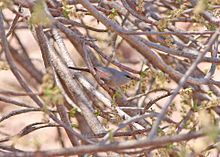| Cinderella waxbill | |
|---|---|

| |
| Scientific classification | |
| Domain: | Eukaryota |
| Kingdom: | Animalia |
| Phylum: | Chordata |
| Class: | Aves |
| Order: | Passeriformes |
| Family: | Estrildidae |
| Genus: | Glaucestrilda |
| Species: | G. thomensis
|
| Binomial name | |
| Glaucestrilda thomensis (Sousa, 1888)
| |
| Synonyms | |
|
Estrilda thomensis | |
The Cinderella waxbill (Glaucestrilda thomensis) is a near-threatened species of estrildid finch found in drier regions of south-western Angola around the Namibe Province, north and east to the south-west of the Huíla Province and north to Fazenda do Cuito in Huambo - also in the extreme north-western part of Namibia. It has an estimated global distribution of 95,700 km2 (36,900 sq mi).

Habitat
The Cinderella waxbill is found in subtropical and tropical (lowland), dry shrubland, savannah and forest habitats at altitudes of 200 to 500 m (660 to 1,640 ft). It is observed that the recent development of a hydroelectric plant on the Cunene River at Epupa Falls has caused changes to insect biodiversity which were relied on by the Cinderella waxbill during feeding of its young - thus threatening its food source to be depleted.
The waxbill also eats grass seeds, nectar and insects. The Cinderella is diurnal.
References
- ^ BirdLife International (2016). "Estrilda thomensis". IUCN Red List of Threatened Species. 2016: e.T22719528A94631643. doi:10.2305/IUCN.UK.2016-3.RLTS.T22719528A94631643.en. Retrieved 13 December 2023.
External links









